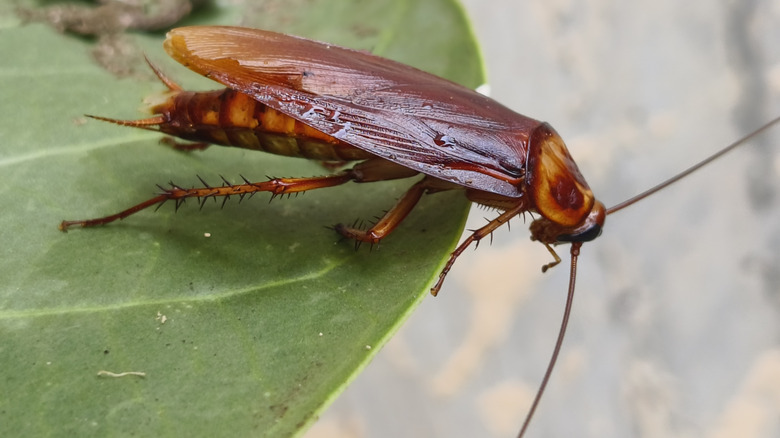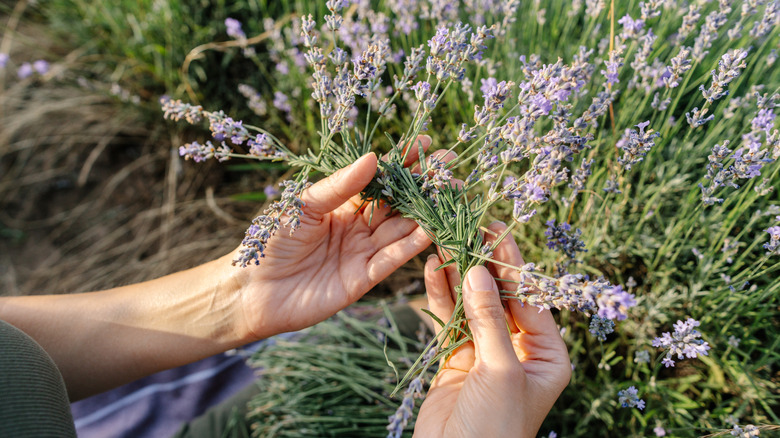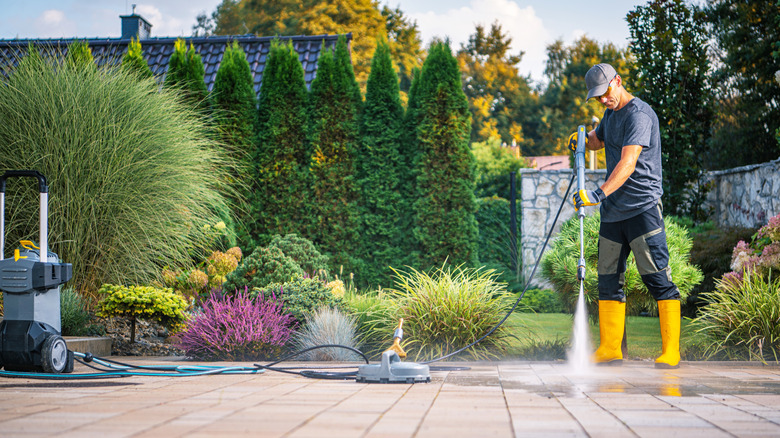Keep Cockroaches At Bay With A Popular, Fresh-Smelling Garden Flower
Just as the sun sets and your yard begins to glow, you spot something dark darting across the patio. It's a cockroach, and if one's out there, more are likely hiding nearby. These pests don't just stay outside, either. Once they find food, warmth, or moisture, they head indoors and bring trouble with them. Cockroaches carry bacteria like salmonella and streptococcus, which can spread food poisoning, diarrhea, and other serious illnesses. Their droppings, saliva, and shed skin also trigger asthma and allergies.
According to Environmental Health Perspectives, there are cockroach allergens in more than 60% of U.S. homes and in nearly every urban household. While chemical sprays are one option, many people are turning to natural deterrents to keep roaches away, and that's where lavender comes in. Although it hasn't been studied extensively against roaches specifically, lavender contains linalool, a fragrant compound that repels a wide range of insects. Linalool works by overwhelming their senses and may even act as a mild neurotoxin. Plus, lavender's strong, fresh scent can mask the food and microbial odors that attract cockroaches in the first place.
How to grow lavender in your garden to deter roaches
If you want a natural way to keep cockroaches out of your yard and home, plant lavender where it counts. This low-maintenance herb thrives in full sun and well-drained soil. It grows best in USDA Hardiness Zones 9 to 11, but can grow in cooler zones if planted in a container and brought indoors during winter. With the right conditions, it's easy to grow a lavender plant outdoors and let it do the work for you. You don't have to water often, and you can skip the fertilizer. In fact, rich soil can do more harm than good to this popular purple plant.
To make the most of lavender's pest-repelling power, plant it near spots where roaches are likely to sneak in. That includes doors, windows, patios, and along the base of your home. Its strong scent can block out the food and moisture odors that usually draw cockroaches in. One of lavender's charms is that it knows the difference between repelling pests like roaches while inviting pollinators like bees and butterflies to linger among its blooms.
Moreover, if you want to boost lavender's bug-repelling power beyond the garden, you can take it a step further by making your own spray. Mix 15 to 25 drops of lavender essential oil with a teaspoon of carrier oil, a teaspoon of witch hazel or vodka, and 1 ½ tablespoons of water. Pour it into a spray bottle, mix well, and spray it around common entry points in your garden. Keep it away from your eyes and mouth while spraying, and wash your skin if any irritation shows up.
A few extra steps to make lavender even more effective
Lavender can do a lot, but it works best when it's part of a bigger plan. If you're serious about keeping roaches out of your yard and out of your house, you'll want to combine it with a few other smart habits. Start with basic cleanup. Roaches love clutter, crumbs, and damp corners. Sweep your patio, wipe down outdoor tables, and don't leave pet food or open trash bins outside overnight. Make sure to repair any faulty pipes or standing water, as roaches need moisture to survive, so cutting off their water supply makes a big difference.
You can also add other plants to support what your lavender is already doing. Mint, rosemary, and catnip are all herbs that may repel cockroaches. Catnip contains a compound called nepetalactone, which repels them even more effectively than some store-bought sprays. You can also try tucking bay leaves or cotton balls soaked in eucalyptus oil into kitchen corners or cabinets.
That said, lavender isn't a magic fix, especially if roaches have already made themselves at home. They're annoying, stubborn pests, and once they've settled in, even strong scents might not bother them. So, if you're spotting them in the garden during the day or they're creeping toward the house, it might be time to bring in a professional before they make their way indoors.


